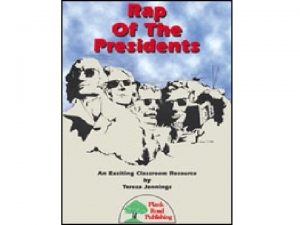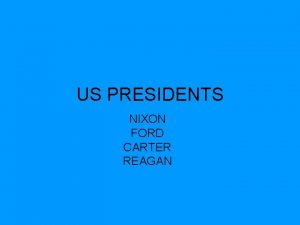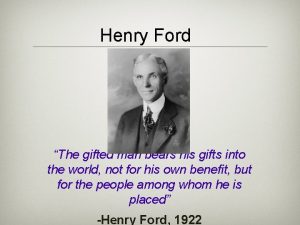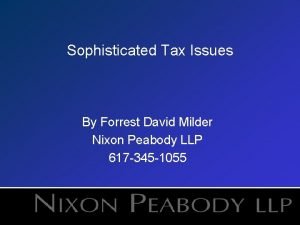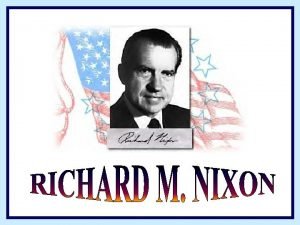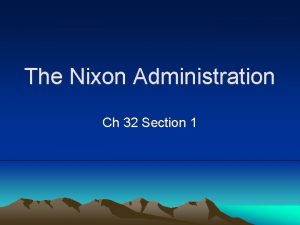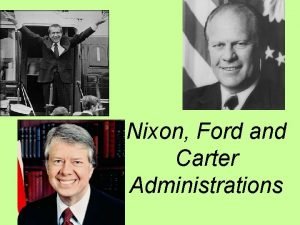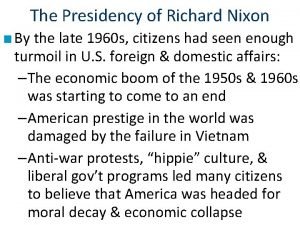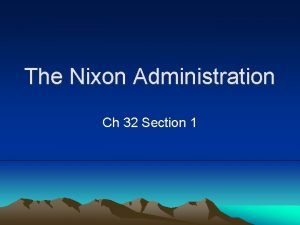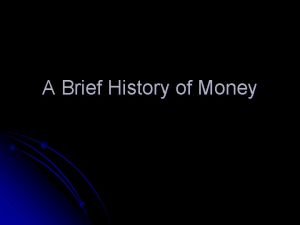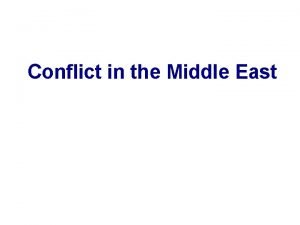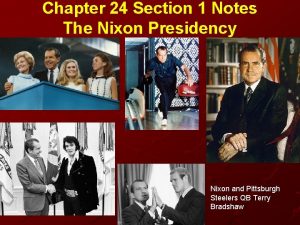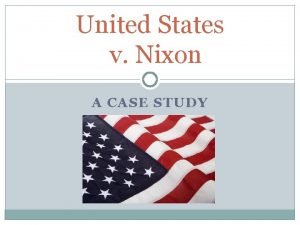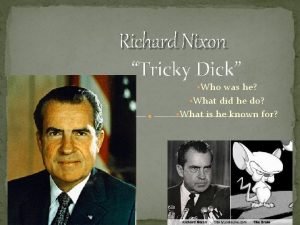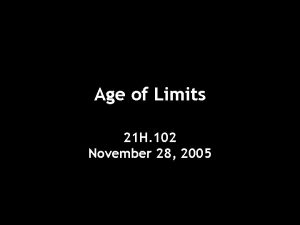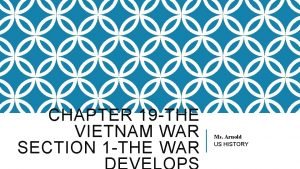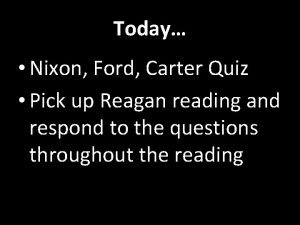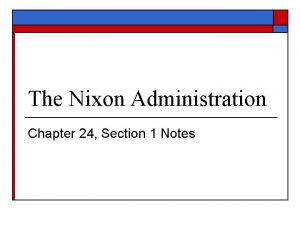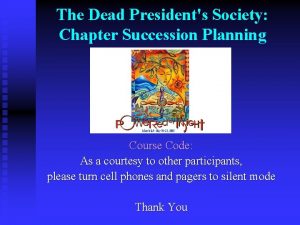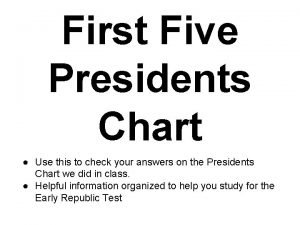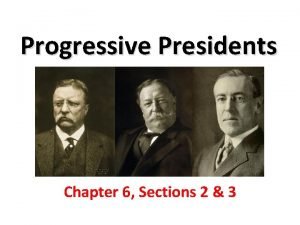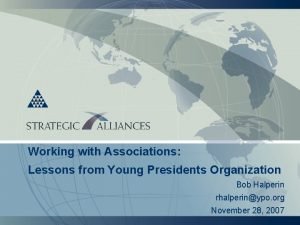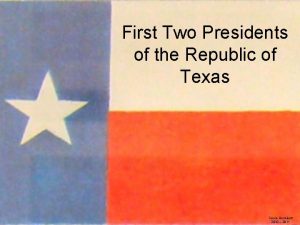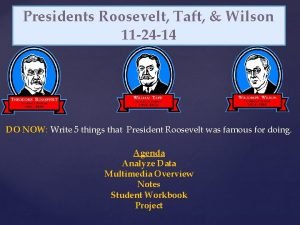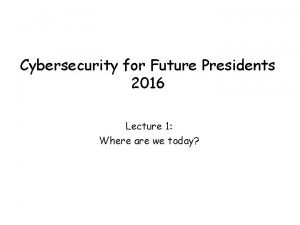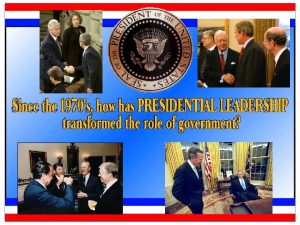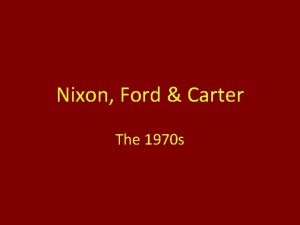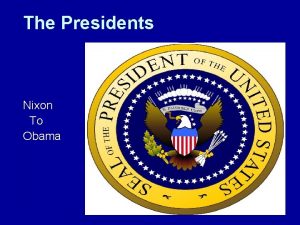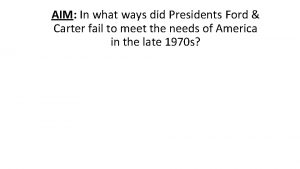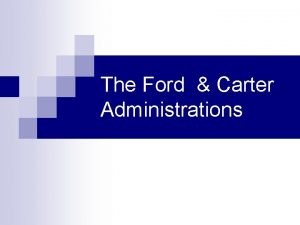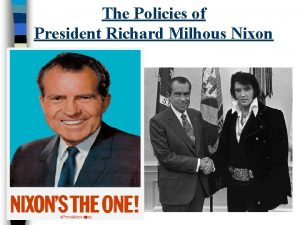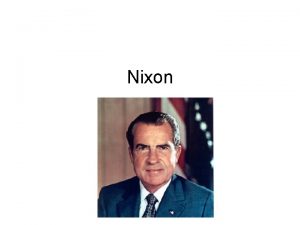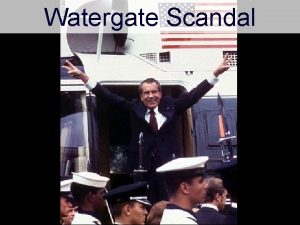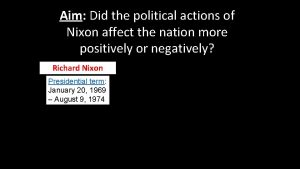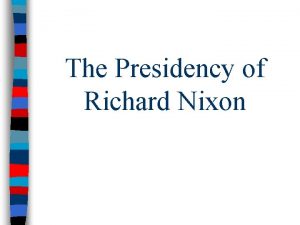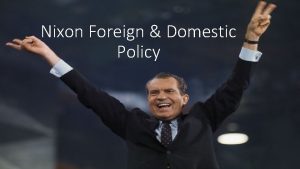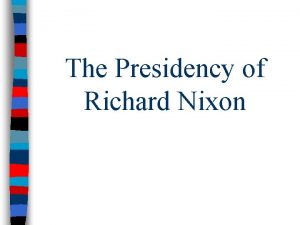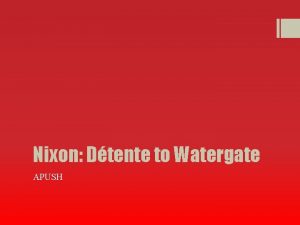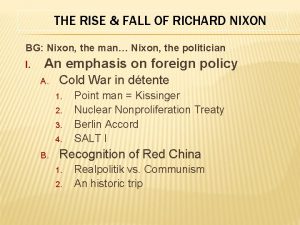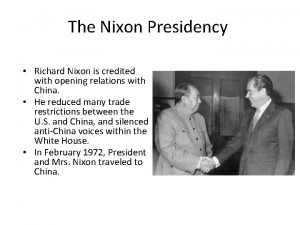AIM Did the policies of Presidents Nixon Ford





































- Slides: 37

AIM: Did the policies of Presidents Nixon, Ford, and Carter impact America more positively or negatively during the 1970 s?

Richard Nixon Presidential term: January 20, 1969 – August 9, 1974

What is Nixon stepping into? • By the late 1960 s, citizens had seen enough turmoil in U. S. foreign & domestic affairs: • The economic boom of the 1950 s & 1960 s was starting to come to an end • American prestige in the world was damaged by the failure in Vietnam • Anti-war protests, “hippie” culture, & liberal government programs led many citizens to believe that America was headed for moral decay & economic collapse

The Election of Richard Nixon’s victory in 1968 was due to the In 1968, Americans elected turnout of a “silent majority” who wanted conservative Republican Richard Nixon a more conservative government

Nixon’s Domestic Policy – NEW FEDERALISM Conservative = limit size of the national government Reduce or eliminate many Great Society programs – TOO $$ States more control over how money for welfare programs was spent

Nixon’s Domestic Policy - the Environmental Protection Agency (EPA) • regulate pollution, emissions, and other factors that negatively influence the natural environment • significant triumph for the environmentalist movement • Earth Day (1970) Occupational Safety and Health Administration (OSHA) ■ assure safe and healthful working conditions for working men and women

One Giant Leap for Mankind: Apollo 11 Mission n. On July 20, 1969, astronaut Neil Armstrong became the first man to walk on the moon. n. Fulfilled the goal JFK had set for the U. S. almost 10 years before, in 1961.

Nixon’s Foreign Policy - Vietnam Nixon’s foreign policy included “peace with honor” in Vietnam Nixon discussed plans for “Vietnamization” but secretly bombed Cambodia & Laos in 1970 In 1973, Nixon negotiated a cease fire, withdrew U. S. troops, & ended the Vietnam War

Nixon’s Foreign Policy - Détente President Nixon successfully changed U. S. foreign policy Instead of using containment to fight Communism & increase Cold War tensions… ■ First president to visit and recognize the People’s Republic of China ■ détente (relaxing of tensions) with America’s Cold War enemies ■ Allow for more US trade with China

Richard Nixon & Foreign Policy Nixon’s détente policy was aimed at easing Cold War tensions with the USSR In 1972, Nixon By became visiting China, the 1 st Nixon pressured president to visit Soviet leader Moscow; Brezhnev His visit led to to the negotiate Strategicwith Arms the. Limitation United States Talks (SALT) to limit missiles

The Presidency of Richard Nixon • Nixon was a popular president by the end of his 1 st term • His domestic policies reduced gov’t spending & revitalized middleclass, conservative, & Southern voters • His foreign policies led to the end of an unpopular war in Vietnam & eased tensions with America’s two biggest Cold War rivals • In 1972, Nixon won one of the biggest landslide victories in presidential history But after Nixon’s re-election in 1972, the Watergate scandal broke…

WATERGATE: Take notes. Why was this such a SCANDAL? VIDEO

■ 1972: a break-in at Democratic candidate headquarters (Watergate Complex) revealed a well-funded plan of espionage & sabotage by Nixon’s Committee to Re-Elect the President (CREEP)

Bob Woodward & Carl Bernstein of the Washington Post broke the Watergate story Their investigation revealed…

The Burglars

White House “Plumbers” stop ”leaks” of classified information (like the Pentagon Papers) to the news media

The Watergate Scandal • The Watergate scandal began to unravel in 1973: • The discovery that Nixon recorded conversations proved most damning • The Supreme Court ordered Nixon to turn over all tapes to a Senate investigative committee • The House brought 3 articles of impeachment against president Obstruction of justice Abuse of power Contempt of Congress


The Watergate Scandal Teddy Roosevelt began the trend of a stronger president Congress; a trend that continued • Impactthan of the Watergate scandal: throughout 20 th century until • 26 membersthe of Nixon’s administration were. Nixon sent to jail • The press began to be seen as a “watchdog” over the gov’t • An independent judiciary branch was vital to protect individual freedom & national interests • Power shifted from the president to Congress After Nixon, Congress enacted campaign finance reform, made it easier for the Justice Department to investigate the Executive Branch, took back some control of the federal budget

Does the Constitution embrace a woman's right to terminate her pregnancy by abortion? Roe v. Wade (1973) A woman's right to an abortion fell within the right to privacy protected by the 14 th Amendment. All states laws prohibiting it were now unconstitutional. Betty Friedan Challenged the widely-shared belief in 1950 s that "fulfillment as a woman had only one definition for American women after 1949 -- the housewife. Second-wave Feminism (1960 s-1980 s) • Feminist author of "The Feminine Mystique” (1960) • Her book sparked a new consciousness among suburban women and helped launch the second-wave feminist movement • President of NOW (National Organization of Women) • Equal Rights Amendment (1972) –

USA from 1974 to 1980 • In the late 70 s, the U. S. was “overextended” • Distrust in government as a result of Vietnam & Watergate • Economy in a recession with high unemployment & inflation • Decline in America’s status in the world • A series of presidents (Ford & Carter) that failed to inspire a sense of hope among the American people…

Gerald Ford Presidential term: August 9, 1974 – January 20, 1977

President Gerald Ford When Nixon resigned in 1974, VP Gerald Ford became president Ford was seen as an “honest man” & hoped to move America past the Watergate scandal But, In September Ford was unable 1974, to Ford movepardoned forward due Nixon to ofconstant any crimes questions related toabout Watergate; a potential Ford criminal lost popular trial of support Nixon What decision did Ford make that truly ruined his popularity and presidency?

Another issue during Ford’s (and also Nixon’s) presidency was a growing economic recession Since the early 1970 s, Inflation, interest rates, Together, a stagnant economy the economy had grown are & unemployment were & high inflation known as: Stagnant economy High inflation stagnant with few new all on the rise STAGFLATION jobs or business profits

Ford’s Foreign Policy – OIL CRISIS Since “automania” of the 1950 s, U. S. use of oil was on the rise In 1960, the oil rich nations in the Middle East & Latin America formed the Org of Petroleum Exporting Countries (OPEC)

Ford’s Foreign Policy – OIL CRISIS Making the economic situation worse was the oil crisis of the 1970 s In retaliation for American support of Israel, OPEC cut off oil to the U. S. in 1973 As a result, gas prices soared & shortages led to long lines for gasoline

Bring In Jimmy Carter! Ford had no answer for stagflation or the gas crisis & was challenged by Georgia Democrat Jimmy Carter in the 1976 election Carter ran as an “outsider” who played no part in Vietnam, Watergate, or the recession

President Jimmy Carter In the 1976 election, Carter beat Ford

Jimmy Carter Presidential term: January 20, 1977 – January 20, 1981

Carter’s Foreign Policy Carter entered office committed to making “human rights” the basis of U. S. foreign policy In 1977, Carter agreed that the U. S. would return the Panama Canal in Dec 1999 Carter hoped to gain peace in the Middle East between Israel & the Muslim nations

Since By the its 1970 s, creation Egypt in 1947, appeared ready Israel to recognize was attacked Israel inbyexchange its for the Muslim return of neighbors land in the Sinai Peninsula 1940 s, 1960 s, & 1970 s 1973 Yom Kippur War between Egypt and Syria against Israel

Carter’s Foreign Policy – Middle East Carter brought Egyptian leader & Israeli leader to the U. S. for the Camp David Accords (September, 1978) VID ? Carter did the impossible ? Egypt recognized Israel’s right to exist Israel agreed to leave the Sinai Peninsula

Carter’s Foreign Policy – Middle East But, the situation in the Middle East got worse in 1979 when fundamentalist Islamic cleric Ayatollah Khomeini led the Iranian Revolution

Carter’s Foreign Policy – Middle East Iranians seized the U. S. embassy & captured 52 American hostages (Iranian Hostage Crisis) Carter tried negotiation, economic threats, & a rescue mission to return the hostages but all efforts failed The 52 hostages were held for 444 days (released when Reagan was elected!)

Carter’s Foreign Policy – Middle East To make matters worse, the Soviet Union invaded Afghanistan in 1979 to defeat an anti-communist uprising The invasion signaled an end to Nixon’s détente with the USSR as the United States sent aid to the Afghan rebels

The Election of 1980 Carter had been unablein tosearch end In By the 1980, election of 1980, Americans stagflation, free the U. S. Reagan hostages Iran, of answers elected Ronald as in president or restore America’s place in the world July 1979 Carter’s “Malaise Speech” • Americans ignored conservation efforts he proposed – due to inflation and the oil crisis • Criticized the American public for falling into a "moral and spiritual crisis • Too concerned with material goods

• By 1980, the USA seemed to be losing its place as the top nation in the world: • The 1970 s presented failures in the Cold War & new problems in the Middle East • The social protests & counter culture seemed to divide liberals & conservatives • Stagflation & the economic recession were growing worse, not better • The failures of Johnson, Nixon, Ford, & Carter left citizens in search of optimism, strong leadership, & conservative policies
 These are the presidents mighty mighty presidents
These are the presidents mighty mighty presidents Nixon ford carter reagan
Nixon ford carter reagan Who was babur
Who was babur How did henry ford treat his workers
How did henry ford treat his workers Splenic rub
Splenic rub Nixon spleen percussion
Nixon spleen percussion David milder
David milder Nixon peabody boston
Nixon peabody boston Nixon quaker religion
Nixon quaker religion Chapter 32 section 1 the nixon administration
Chapter 32 section 1 the nixon administration Vicki nixon
Vicki nixon Vanderbilt isfaa form
Vanderbilt isfaa form Regents of university of california v bakke
Regents of university of california v bakke Richard nixon
Richard nixon Jerry nixon microsoft
Jerry nixon microsoft Chapter 32 section 1 the nixon administration
Chapter 32 section 1 the nixon administration Nixon tally stick download
Nixon tally stick download Nixon china
Nixon china Chapter 24 section 1 the nixon administration
Chapter 24 section 1 the nixon administration Característica de la educación
Característica de la educación United states v nixon outcome
United states v nixon outcome Nixon safety
Nixon safety Tricky dick: the rise and fall and rise of richard m. nixon
Tricky dick: the rise and fall and rise of richard m. nixon Nixon leaving white house
Nixon leaving white house Chapter 19 the vietnam war
Chapter 19 the vietnam war 882
882 Chapter 24 section 1 the nixon administration
Chapter 24 section 1 the nixon administration Herbalife umsatz
Herbalife umsatz Gilded age presidents
Gilded age presidents Dead president society
Dead president society 1st five presidents chart
1st five presidents chart William howard
William howard Presidents club of dayton
Presidents club of dayton Young presidents association
Young presidents association First two presidents of the republic of texas
First two presidents of the republic of texas Comparing progressive presidents roosevelt taft and wilson
Comparing progressive presidents roosevelt taft and wilson Grover cleveland stirred political opposition by
Grover cleveland stirred political opposition by Xkcd presidents
Xkcd presidents
